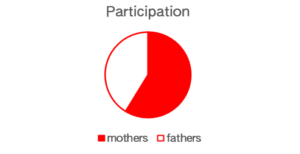Between October 2021 and February 2022, we conducted a pilot study with the principal goal of testing our questionnaire package. To do so, we visited a number of secondary schools in the Brussels region, where we distributed questionnaires among pupils from the 5th and 6th grades to invite their parents to participate in our study.
A total of 177 parents were so kind to fill out the questionnaires and to send these back to university. The sample was composed of somewhat more mothers (104 mothers; 59%), and the parents had a mean age of 49 years. They filled out general questionnaires about their personal functioning and about how they think about the world around them, but they also completed a number of questionnaires regarding their relationship with the child that had passed their questionnaire package. These “target” children were on average 16.5 years old, there were somewhat more girls (56%), and 60% were in 5th grade, whereas the other 40% were in 6th grade.

Overall, the results of our study were encouraging, as most of our questionnaires worked as they should: that is, most of the items of the questionnaire measure what they are supposed to measure, although a few minor adaptations were needed for our main studies. Moreover, Elliana Lamprianidou and Kate Gibb are currently analyzing these data in the context of their PhD, and they are presenting preliminary results of these analyses on the conference of the Belgian Association of Psychological Sciences in Leuven during a poster session. Elliana examined the relation between parental gender ideology and parenting, as well as the intervening role of high expectations towards contemporary parents, and especially mothers. You can download her poster here. Kate tested whether parents’ perceptions of insecure work and economic inequality matter for parenting, as well as the role of parental personality in explaining this link.